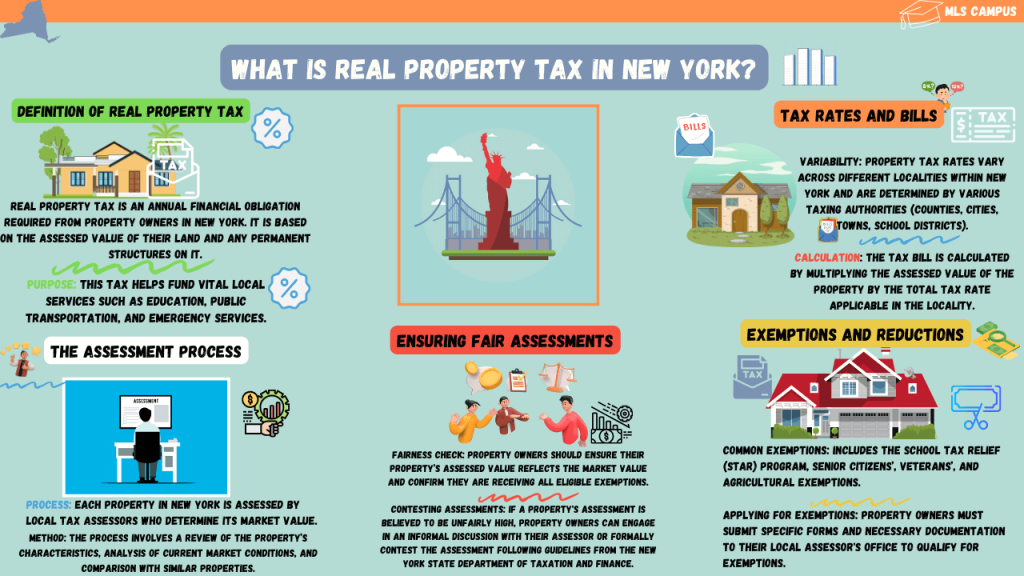What is Real Property Tax in New York?

Ever wonder why managing real estate taxes in New York feels like navigating a complex maze? Whether you’re nestled in a Brooklyn Brownstone or tucked away in a Catskills cabin, getting a grip on property taxes is more than just beneficial—it’s crucial.
Property taxes impact homeowners, investors, and even renters, influencing everything from monthly budgets to long-term financial planning. Yet, many people remain unclear about how these taxes work, what factors affect them, and—most importantly—how to lower them legally.
This guide strips away the complexities of assessments, rates, and exemptions, arming you with the knowledge to tackle your taxes confidently. By the end, you’ll understand how property taxes are calculated, how to challenge unfair assessments, and how to save money with exemptions.
Ready to smooth out the bumps in your tax journey? Let’s dive in and ensure your next tax season is as predictable as the changing seasons in the Empire State.
1. Understanding Real Property Tax
What is Real Property Tax?
Real property tax is an annual financial obligation that property owners in New York are required to pay based on the assessed value of their land and any permanent structures on it. This tax funds vital local services such as education, public transportation, and emergency services, which directly affect the quality of life in communities.
The Assessment Process
In New York, every property is assessed by local tax assessors who determine its market value. This valuation is crucial as it forms the basis for the tax due. The assessment process includes a thorough review of the property’s characteristics, analysis of current market conditions, and comparisons with similar properties. This ensures that each property owner pays a fair share of taxes relative to the value of their property.
2. Tax Rates and Bills
Determining Your Tax Rate
Property tax rates in New York are not uniform but vary across different localities. They are determined by various taxing authorities such as counties, cities, towns, and school districts. These rates are set based on the financial needs of these communities, which means your total property tax rate is a composite of these individual rates.
Calculating Your Tax Bill
Calculating your property tax involves multiplying the assessed value of your property by the total tax rate applicable in your locality. For instance, if your home is assessed at $300,000 and the combined tax rate is 2%, your annual property tax would amount to $6,000. This formula is vital for homeowners to understand for effective budgeting and financial planning.
Variability of Tax Rates
The tax rates across New York State can significantly differ, reflecting the unique financial needs of each locality. For instance, tax rates in urban areas like New York City might be higher compared to rural areas due to the higher cost of providing services such as sanitation, police protection, and public education.
Impact of Property Tax Caps
New York State has implemented a property tax cap, which restricts the amount by which local governments and school districts can increase property taxes. Understanding how this cap affects your tax bill can be essential for long-term financial planning.
3. Exemptions and Reductions
Common Tax Exemptions
New York State offers various tax relief programs to reduce the tax burden for eligible property owners. These exemptions include the School Tax Relief (STAR) program, senior citizens’, veterans’, and agricultural exemptions. Utilizing these can lead to substantial savings on your property taxes.
Detailed Analysis of STAR Benefits
The STAR program’s specifics can greatly impact a homeowner’s annual expenses. For example, the Enhanced STAR exemption provides significant savings for seniors, based on their income levels, compared to the Basic STAR, which is available to all homeowners meeting the residency requirements.
Additional Exemptions
Besides the common exemptions, other specialized exemptions, such as those for improvements that increase residential accessibility for persons with disabilities, can further reduce tax liabilities.
How to Apply for Exemptions
To apply for exemptions, property owners must submit specific forms along with necessary documentation to their local assessor‘s office. Being aware of the application deadlines and the required documents is crucial for taking advantage of these tax relief opportunities.
4. Ensuring Fair Assessments and Contesting Unfair Ones
Is Your Property Tax Assessment Fair?
Assessors in communities that evaluate properties at 100 percent of market value aim for assessments to match the sales price a property could realistically fetch in the market. For areas assessing at a percentage of market value, property owners should review the tentative assessment roll each year to verify the accuracy, ensure fairness, and confirm they are receiving all eligible exemptions.
Real-Life Example
Real-Life Example: Consider Alice, who owns a renovated townhouse valued at $500,000 in Queens. Her area’s combined tax rate is 1.8%. Without exemptions, her tax would be:
Annual Property Tax= $500,000 × 1.8% = $9,000
After a senior citizen exemption reduces her assessment by 20%, her new tax calculation becomes:
Annual Property Tax with Exemption = $400,000 × 1.8% =$7,200
This illustrates the financial impact of understanding and applying for tax exemptions.
5. How to Challenge Your Assessment
If you believe your property assessment is unfairly high, initially engage in an informal discussion with your assessor. If not resolved, you can formally contest the assessment by following the New York State Department of Taxation and Finance guidelines. Search for “contest an assessment” for forms and detailed procedural information.
FAQs:
- What properties are subject to real property tax in New York?
- All real property, including residential, commercial, and agricultural lands, is subject to tax unless explicitly exempted.
- How can I find out my property’s assessed value?
- Your property’s assessed value is listed on your tax bill and can be found on your local assessor’s official website.
- What if I disagree with my property’s assessed value?
- Start with an informal discussion with your assessor. If unresolved, you can formally challenge the assessment through the procedures listed at www.tax.ny.gov.
- Are there penalties for late payment of property taxes in New York?
- Yes, late payments can result in penalties, interest charges, liens, or foreclosure. Always ensure payments are made by the due dates specified by your local tax authority.
- How do exemptions affect my property tax bill?
- Qualifying for exemptions can significantly reduce your assessed value and, consequently, your tax liability, as demonstrated in the guide with Alice’s example.
- Can I apply for more than one tax exemption?
- Yes, property owners who meet the criteria for multiple exemptions can apply for and receive benefits from more than one program.
- What is the STAR program, and who qualifies for it?
- The STAR (School Tax Relief) program provides property tax relief to eligible New Yorkers in the form of a rebate or exemption. Homeowners with an income of $500,000 or less and who own and live in their homes are eligible for the Basic STAR exemption, while seniors aged 65 and older with specific income criteria qualify for the Enhanced STAR exemption.
Discover Your Path in New York Real Estate with MLS Campus
Looking to launch or advance your career in real estate in New York? MLS Campus offers comprehensive courses for both aspiring salespersons and seasoned brokers. Our New York Salesperson and Broker courses are designed to equip you with the knowledge and skills necessary to excel in the competitive New York real estate market.
For Salespersons: Our course provides a thorough understanding of real estate principles, New York-specific laws, and practical aspects of real estate sales and transactions. It’s perfect for new entrants into the real estate industry, offering everything needed to prepare for the New York real estate licensing exam.
For Brokers: Advanced topics and deeper insights await in our broker course, which is ideal for experienced real estate professionals aiming to expand their expertise and leadership in the market. This course covers advanced real estate law, brokerage management, and investment property analysis, setting you up for success in managing your agency or enhancing your operational skills.
Both courses are offered online, allowing you to learn at your own pace and on your own schedule. Enroll today to begin your journey in real estate or to take your professional skills to the next level.
Explore our offerings at MLS Campus New York Salesperson Course and MLS Campus New York Broker Course and start making your mark in the real estate world!
30 Days Limited Money Back Guarantee Policy
If you decide you’re not 100% satisfied within the First 30 Days of your initial purchase, simply contact us by email and request a cancellation and full refund. You will receive a full refund of your purchase price. If the final exam has been taken, a refund can not be issued. The Real Estate Exam Prep Master and the Exam Prep Math, if purchased separately are not refundable.
Course Duration
The course is active for six months from the date of purchase. We offer the 7th month for free if needed. If your course has been active for 7 months or more, you can purchase one-month extensions. It is possible to have the course extended by up to one year by purchasing monthly extensions online.
Customer Support: Call us at (877) 331-6235 or Contact us by Email
If we can assist you with Technical Support, General License Inquiries or Questions about Course Material please contact us.
Questions about course material: An Instructor is available Monday through Friday a week from 9 am to 7 pm (EST)
Technical Support or any other questions: Our office staff are available Monday through Friday a week from 9 am to 7 pm (EST)
We do our best to reply promptly to emails on Weekends
*Except for Major Holidays
Join Over 100,000 Students Enroll With MLS Campus now
Become Part of MLS Campus School to Further Your Career.












